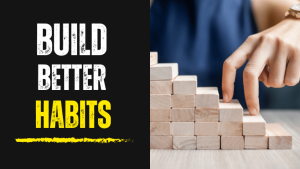Have you ever come across the saying, ‘Humans are creatures of habit’?
We’ve probably all heard it at some point.
But here’s the real question: If we’re such habitual beings, shouldn’t it be a walk in the park to just create some good habits?
Well the answer is, not quite.
It’s not as simple as just deciding what habit you want and watching it magically form.
You see, most of us are wired to stick to our routines.
It’s what makes us such creatures of habit in the first place.
But on some occasions, those very habits that define us can also hold us back or lead to negative consequences.
So, if you’ve realised that some of your habits need a makeover, you’re in the right place.
The big secret to breaking bad habits lies in replacing them with better ones.
Before you can change any of your old bad habits to make good ones, you need to examine the ones you already have.
Then decide what you need to add or take away.
For instance, if you want to make it a habit to work out every morning, you need to figure out what you currently do in the mornings that you are not going to do anymore.
Find out what sets you off and what stops you.
And what usually makes you act a certain way, and how do you respond to it?
Here are some methods on how to build habits that will help you get started towards discovering a better you:
You have to develop a plan
Set the exact time and place where your new behaviour is going to happen.
Stuff like “I will exercise more starting next week” is just too general.
You have to be clear and detailed about what you want and what you are going to do.
Then come up with a method for how you are going to change your old habits.
And add it to your plan so it gets done when it needs to.
Making a big list of all the habits you want to start doing is a surefire stepping stone to failure.
So don’t do it.
Instead, aim to change just one habit at a time before trying to change another.
Getting into a good habit takes a bit of work, especially if you’re trying to change a bad habit you’ve had for a long time.
Start small enough that you won’t need much effort to keep going.
For example, instead of running on a treadmill for 30 minutes, just start off with, say, 5-minute intervals.
This will help you get into the habit of establishing your new behaviour.
Then, once you are used to that level, you can increase the effort and build up by adding a bit more.
Use visualization and positive statements
Try using visualisation and positive affirmations to make it easier to pick up your new habit.
These techniques let you imagine yourself already enacting the habit, helping to imprint it on your mind.
It’s like training your brain to accept and do the habit automatically, which speeds up the process.
First, make a firm commitment to developing your new habit. For example, if you want to start eating a healthy breakfast every day, promise yourself that you’ll stick to the plan without skipping a day.
Put in some effort and really get into the habit.
Keep track of your progress by marking your calendar each time you succeed, and before you know it, you’ll be on a streak you won’t want to break.
Remember to treat yourself
We get into bad habits because they make us feel good or give us comfort at some point.
So, if you want to develop a good one, find a way to thank yourself for the little things that you do well.
Like a little shopping trip, a day out, or a special meal as a reward.
Treat yourself to something that you want but have been putting off.
Make sure the prize fits the goal.
For example, if your goal is to lose weight, it’s not a good idea to use food as a reward.
When you give yourself a treat for doing a good job, it confirms and reinforces the behaviour, so your brain soon starts to link the behaviour to the pleasure of getting a reward.
Enlist the help of your friends and family. They are the ones who can encourage you to keep going should things start to get a bit tough.
And try to surround yourself with like-minded people; that way, you’ll be more likely to continue doing the things you want to change.
It can be quite challenging to start a new good habit.
At times, you will stumble and think you can’t do it anymore, but you have to keep going and be consistent with your efforts.
The more you do it, the more likely it is that it will become a habit.
Once you learn how to build habits, you won’t have to use much energy or put in a lot of effort to do them.
They will just become automatic.






